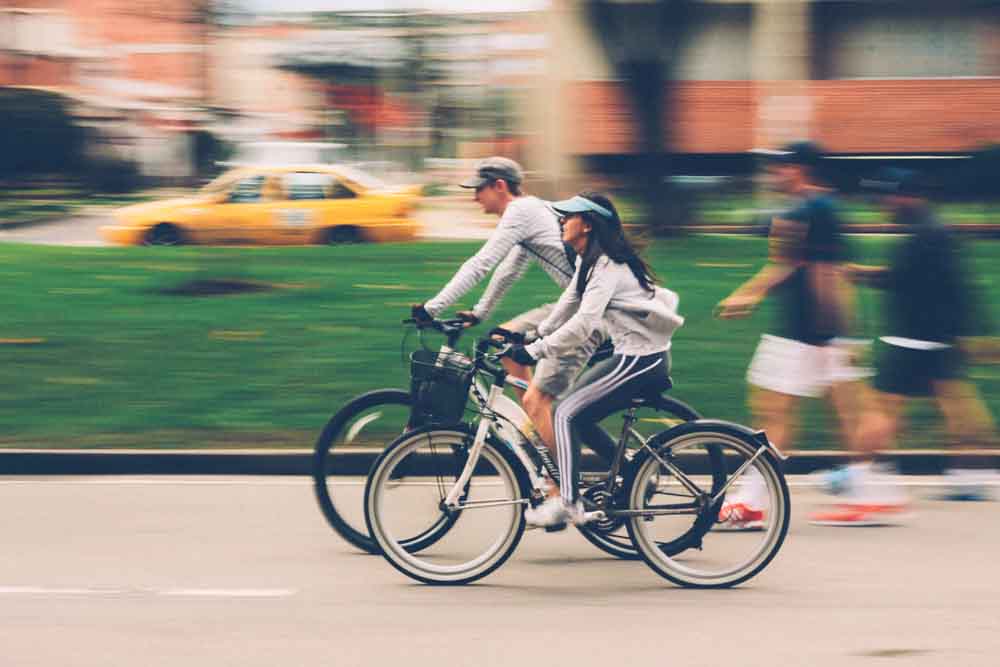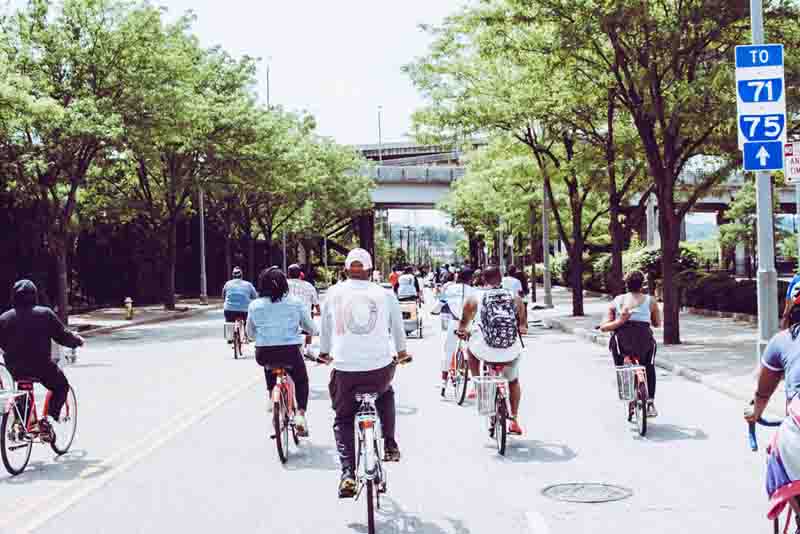Two key focus of my blog are Athletics/Sports and Health/Wellness. A common activity/pastime/sport is cycling. It’s thought to be universal activity, one which individuals with certain physical limitations such as hip replacements can safely participate in but it is 100% beneficial for you? The following contributed post is entitled, Cycling Might Not Be All That Good For You After All.
* * *
Cycling is currently undergoing a resurgence in popularity. Everyone wants to hop on a bike, cycle to work, and get healthy, especially when there are significant risks for using public transport.
Public health officials love the idea too. For years, they’ve been pushing cycle lanes and bicycle-to-work incentives to get people riding on two wheels. For them, it’s a solution to the longstanding obesity epidemic. If people cycle to work, they’ll lose weight, get healthy, and reduce the strain on the health system.
Cycling, however, remains a bit of fringe activity. People do it – but not in the numbers required to make much of a dent in motor vehicle use. Plus, it is such a fleeting part of most people’s lives that there are only limited scientific studies on the downsides of the activity. For that reason, there’s barely any pushback that recognizes both the benefits and risks.
And there are risks. We mustn’t forget that.
The Benefits Of Cycling

Before delving into why you might want to avoid the current cycling craze, let’s be clear on the benefits. We’re not saying that riding a bike is a bad thing, like smoking. It’s just that it isn’t just a list of benefits: there are costs too.
Cycling has all sorts of positive effects on your body. For one, it helps to improve your posture. Riding a bike requires the use of all kinds of core muscles, and it forces you into a particular stance, which enhances the overall balance of your body.
The exercise you do while riding a bike may also increase your level of cardiovascular fitness. The more you ride around, the healthier your heart and lungs become.
There’s also a good deal of evidence that riding a bike reduces your levels of stress more than practically any other form of exercise. There’s something uniquely freeing about the sensation of pedaling with a smooth-riding contraption between your legs. You feel liberated, particularly when you go offroad, something that might reduce blood pressure.
Finally, it may increase muscle mass, especially around the legs and buttocks, thus raising your natural metabolic rate.
Nobody seriously disputes the benefits of cycling – and in a perfect world, there would be only benefits. But in reality, that’s not how it pans out. Cycling has serious drawbacks, and we need to discuss them.
It’s Physically Dangerous

Cycling is one of the most dangerous things that you can do on the road. You wouldn’t run down the middle of the street with cars passing by on all sides, but that’s essentially what you’re doing when you ride a bike. You’re not in a vehicle, so you have no protection. It’s just your soft, fleshy body, versus metal bodywork.
Per mile traveled, cycling is one of the most dangerous forms of transport, which is why city authorities are so keen to install bike lanes. Bureaucrats know that motorists don’t pay as much attention to cyclists as they should, and that’s when accidents happen.
Cyclists also have a penchant for ignoring the road rules – another thing that gets them into trouble. Jumping red lights or under-taking are tempting when you’re on a bike, and you know you’re not going to get caught. But they also make getting from A to B more dangerous.
Even if you go offroad, there are still serious risks. Mountain biking isn’t a sport known for its low chance of injury. If you come off at speed, you can easily break bones and concuss yourself. Wearing elbow and knee pads can remove some of the chance of serious injury, but not all of it.
The Pollution
Cycling around in city traffic also exposes cyclists to a host of unpleasant fumes from ICE vehicles. Diesel is the worst. It contains tiny particles that damage the lining of the lungs, eventually leading to serious conditions, like cancer. They get in through the nose and mouth and bury themselves in the soft tissue that lines the passageways that lead to the lungs. With enough exposure, cyclists can eventually develop a sore throat and more severe conditions, especially if they spend more than an hour per day in heavy traffic conditions.
Pollution levels are often higher in places where cycling is more important. In China, for instance, officials want to encourage it to prevent cities from being overrun with cars. Therefore, regular folks are going to need assurances that they’re not damaging themselves at the same time.
The Fertility Issues
If you thought that bouncing along on a tiny saddle was a bad idea, you are right. Researchers rethink that the act of riding a bike restricts the arteries that flow to the testicles. Cycling is a significant reason why so many people visit a male infertility doctor. It’s an unseen factor that prevents families from having children.
You might think you can avoid fertility issues by wearing padded shorts and avoiding lycra, but it’s not as simple as that. Vasoconstriction appears to happen regardless of the level of padding, so it’s not just a matter of pressure. There seems to be something about the very act of cycling itself that causes problems.
We tend to forget that bicycles are contraptions, not parts of the natural environment. Operating them, therefore, could be just as much of a risk as anything else. Like so many other machines, they may not perfectly conform to our bodies’ ergonomics, causing problems.
Fertility issues may be just the tip of the iceberg, too. Evidence suggests that cycling regularly can lead to muscle imbalances and knee problems, especially if cyclings clip into their pedals.
The Cost

Cycling might seem like a cheap form of exercise. But the moment you get serious about it, the price rises significantly. If you want to go running, you put on a pair of sneakers and hit the trails. If you’re going to go cycling, you have to spend at least a couple of hundred dollars on a bike, and extra money on helmet and gloves. And that’s just for the basic kit. Serious cycling is much more expensive.
The average mountain bike, for instance, is an extremely sophisticated machine with dozens of moving parts. Brand new, these bikes typically cost thousands of dollars and are top on the list for criminals to steal. They’re highly transportable, and there is no central registry, tracking who owns what. It’s not like cars.
The same applies to road bikes too. Quality cycles in this category are often made of carbon and cost thousands of dollars. Replacing them isn’t easy.
On top of the upfront cost and the risk of theft, you also have ongoing maintenance issues. Serving a car might cost $500 per year. If you buy a top-end bike, you can easily spend that sort of money on your machine as well. It gets expensive.
The Importance Of Dialogue
Cycling is hailed as the preferred mode of transport for the 21st century. It’s green, good for you, and, dare we say it, fun. But people have become so enthused that a serious discussion of the risks is no longer a part of the dialogue.
The truth, though, is that cycling is not as innocuous as checkers. It comes with risks to health, many of which are far higher than driving in a car. Modern society is set up for the motor vehicle. Like it or not, that’s how the world has developed. The pushbike was, until the pandemic, way down the list of most people’s priorities. Some city councils built cycle lanes, but they were often an after-thought and seldom used. The vast majority will always prefer to go around on four wheels. And so getting around frequently requires riding on the road.
Cycling isn’t as accessible as many people imagine, either. First, you have to be physically fit to do it, which many people are not. You also have to have parents who taught you to ride a bike. If you’re an adult who can’t, you either have to learn – which isn’t easy – or forget about it. And, secondly, cycling is more expensive than many people imagine. Bikes might be cheap for policymakers on fat salaries. Still, they’re far dearer for the average person looking to make a living.
Therefore, it is critical that we have a sensible dialogue about cycling as a form of transportation. If it really were as good as people imagine, then we would all be doing it, but we’re not. Many of us use our cars at the first opportunity, even if it’s just to go down the street to pick up some groceries from the store.
We have to question; why? Is it just laziness? Or does cycling come with some serious risks? Do people avoid it for good reasons? Imagine if the government was pushing motorcycling, which is as dangerous as riding a pushbike per mile traveled. There would be an uproar. It would be irresponsible. But for some reason, the same rules don’t apply to bikes. Perhaps that needs to change?
